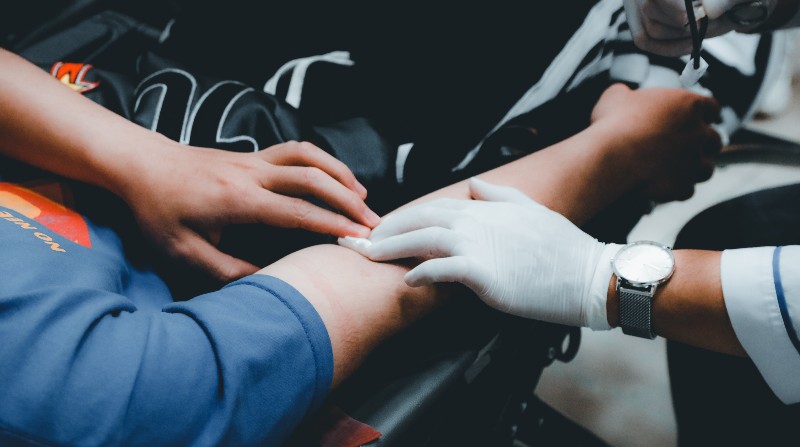
A DWI blood test in Texas is one method authorities use to determine the amount of drugs or alcohol in a person’s bloodstream.
Prosecutors often use the blood test results to convict individuals who are charged with driving while under the influence.
The existence of a DWI blood test with positive results for alcohol or drugs does not mean the prosecutor will achieve an automatic conviction.
The way the blood test was administered, the maintenance or lack thereof of the equipment used, and the results of the test must all be taken into consideration when determining the proper punishment.
An experienced San Antonio DWI lawyer can review the details of your case and examine the credibility of your blood test.
If law enforcement collected a blood test after your DWI arrest, contact a lawyer at Austin Hagee Law Firm to discuss your case. Our team has handled hundreds of Texas DWI cases and knows what it takes to secure favorable outcomes for our clients.
Contact our team today to schedule an appointment with a member of our team.
When is a Texas DWI Blood Test Collected?
Texas law requires drivers who are arrested under suspicion of DWI to submit a blood or breath test to determine the concentration of alcohol in their system. Drivers who refuse to provide a blood or breath sample can face additional charges for their refusal.
After collection, a blood sample goes to the Texas Department of Public Safety, Toxicology Section, for testing. The blood test can take several months, depending on the laboratory’s current workload.
The results will show whether the driver’s blood alcohol concentration (BAC) was above the legal limit of 0.08%.
Texas law requires a qualified medical professional to conduct the blood draw.
Additionally, the medical professional must comply with scientific protocols when conducting the blood draw. Improper collection or storage of the blood sample can compromise its integrity and admissibility.
An experienced DWI attorney can gather information about the collection and storage of your blood sample and challenge issues with its credibility.
What happens if I refuse a Blood Test?
The Texas implied consent law means that by driving on Texas roads, you automatically consent to submitting to chemical testing if you are arrested on suspicion of DWI.
By refusing to do so, you can receive a civil refusal charge against your license with the Texas Department of Safety, along with a separate criminal DWI charge.
A refusal can result in losing your driver’s license privilege for 180 days in Texas. A second or subsequent refusal within ten years of a DWI conviction, a prior refusal, or a failed chemical test can result in losing your driver’s license privileges for two years.
Is there an alternative to a DWI Blood Test?
Law enforcement can also collect a breath sample to determine the alcohol concentration in your blood. This breath test is typically performed at the police station you go to after your arrest. The same rules for refusal apply to the breath test as the blood test.
This rule does not apply to the portable breath test (PBT) that law enforcement may ask you to complete at the scene of your traffic stop.
Under Texas law, you can refuse to submit to a PBT or roadside test without civil penalties to your driver’s license. This is not the case for evidentiary breath tests administered after an arrest on a properly maintained breathalyzer at the police station.
Contact an Attorney at Austin Hagee Law Firm to Discuss Your DWI Blood Test
The DWI lawyers at Austin Hagee Law Firm use our past experience as district attorneys and from many similar cases to examine every possible issue with each case to negotiate the most favorable plea agreements for our clients and defend their rights.
Our team has over a decade of experience representing clients accused of DWI’s from first offenses to second offenses pand beyond.
We know what it takes to get a client’s charges reduced or dismissed. If you or a loved one are facing DWI charges in Texas, contact a DWI defense attorney at Austin Hagee Law Firm today. Let us put our experience and resources to work for you.
Frequently Asked Questions
Our team answered some commonly asked questions about DWI charges in Texas.
What do Prosecutors need to prove for a DWI Charge in Texas?
Texas Penal Code § 49.04 prohibits drivers from operating a motor vehicle while intoxicated. In Texas, “intoxicated” means the driver:
- Has a blood alcohol concentration (BAC) of 0.08% or more, or
- Lacks the normal use of mental or physical facilities due to the use of drugs or alcohol.
The prosecutor must prove that the accused operated a vehicle and that they were intoxicated, as defined above, at the time they did so.
What are the Penalties for a DWI in Texas?
A first DWI conviction in Texas is a Class B misdemeanor, which carries a jail sentence of up to 180 days and a fine of up to $2,000. If the driver’s BAC was 0.15% or more, the DWI is considered a Class A misdemeanor, which carries a jail sentence of up to one year and a fine of up to $4,000. Also, a conviction for DWI with a BAC of .15 can trigger surcharges with the state of $2,000 per year for three years. A second DWI conviction is considered a Class A misdemeanor in Texas and carries a mandatory minimum 3-day jail sentence after being convicted. A third DWI conviction is considered a third-degree felony, which carries a prison sentence of between two and ten years and a fine of up to $10,000.
Additionally, you can also lose your driver’s license after a DWI conviction.
What Legal Defenses apply to DWI Charges?
In some scenarios, a legal defense can defeat an element of the charge and encourage the prosecutor to dismiss or reduce your charges. Legal defenses that can apply to DWI charges include:
- The officer lacked reasonable suspicion to make the traffic stop,
- Your blood or breath sample was collected incorrectly
- You were not operating the vehicle, or
- The results of your blood or breath test results are unreliable due to improper machine maintenance, calibration, or other errors.
Our DWI lawyers can review the details of your case and see if a legal defense applies to your situation.
Can I refuse to complete Roadside Sobriety Tests?
Although law enforcement will not always tell you so, roadside sobriety tests are completely voluntary. The officer cannot use proof of your refusal as evidence that you were driving under the influence. Many people consent to roadside standardized testing because they do not realize they can refuse. These tests only give officers more information they can use to support your DWI arrest. If an officer asks you to complete roadside sobriety tests after a traffic stop, you should politely decline.
